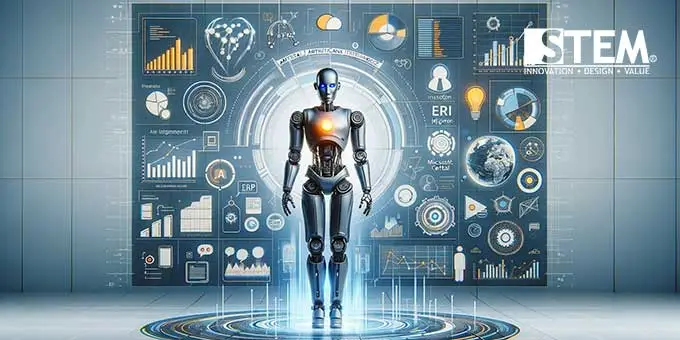In the current era of technological revolution, the role of Artificial Intelligence (AI) is increasingly penetrating various aspects of our lives. One domain where the presence of AI truly transforms the paradigm is in Enterprise Resource Planning (ERP) systems.
In this article, we will delve into our understanding of how AI is involved in the ERP ecosystem, particularly in the context of Microsoft Business Central, and how it contributes to improving business efficiency and productivity.
AI Optimizing Business Processes
In a digital transformation era, businesses can no longer rely on conventional methods in managing their resources and information. Microsoft Business Central, as a leading ERP system, integrates AI technology to assist users in making smarter and more efficient decisions.
AI in Microsoft Business Central helps enhance operational efficiency by automating routine tasks. With AI assistance, ERP systems can process and analyze data at lightning speed, generating relevant and real-time information for faster decision-making.
Personalizing User Experience
In the context of user experience sustainability, AI’s role in Microsoft Business Central involves deeper personalization. For instance, AI can play a specific role in helping users create compelling product descriptions for their online stores.
1. Unlimited Creativity
With AI support, users can explore limitless creativity in crafting product descriptions. Intelligent algorithms can analyze historical data related to customer preferences and market trends, generating unique and appealing ideas for describing products in the most suitable manner.
2. Adapting to Customer Preferences
Through in-depth consumer data analysis, AI can understand the unique preferences of each customer. Consequently, product descriptions can be automatically adjusted, creating a more personalized and relevant experience for each online store visitor.
3. Captivating Language Use
AI is not only capable of understanding customer preferences but also of generating product descriptions with captivating language. AI algorithms can compose engaging sentences, sparking the interest of potential buyers and making products appear more attractive to consumers.
4. Sentiment Analysis for Customer Satisfaction
Through sentiment analysis, AI can understand how product descriptions are received by consumers. By monitoring feedback and customer reactions, the system can automatically adjust writing style and focus on product descriptions to enhance overall customer satisfaction.
5. Personalization Based on Purchase History
AI in Microsoft Business Central can also use customer purchase history to personalize product descriptions. If a customer frequently buys a particular product, AI can highlight specific features or benefits of that product in the description to increase the likelihood of repeat purchases.
6. Engagement Through Narrative Storytelling
To enhance engagement, AI can help users create product descriptions through narrative storytelling. By analyzing effective storytelling data and trends, algorithms can guide users in crafting stories that create an emotional connection with potential customers.
7. Customization Based on Market Segmentation
AI can leverage market segmentation for better personalization. Based on specific demographic or consumer behavior characteristics, product descriptions can be adapted to be more in line with the preferences of particular groups.
8. SEO Improvement through Relevant Keywords
In efforts to enhance online visibility, AI can assist users in creating SEO-optimized product descriptions. By analyzing the most relevant keywords in a specific industry, the system can provide keyword suggestions to be included in product descriptions, improving the online store’s ranking in search results.

Enhancing Customer Service Quality
In the context of improving customer service quality, the presence of Artificial Intelligence (AI) in Microsoft Business Central is a crucial pillar for achieving these goals. Here are ways AI contributes to providing better and more responsive customer service.
1. Quick and Automated Responses
AI brings the capability of quick and automated responses to customer service. With an integrated system, customer questions or requests can be instantly answered without long wait times. This creates an efficient customer experience and reduces response time from the company.
2. Customer Sentiment Analysis
AI can analyze customer sentiments from their interactions with customer service. Through natural language processing, the system can understand whether customers are happy or dissatisfied. With this understanding, the company can take proactive actions to solve issues or improve specific aspects that can enhance customer satisfaction.
3. Understanding Context in Queries
With the help of AI, the system can understand the context in customer queries. Even if questions are formulated differently, AI can identify the core of the question and provide appropriate answers. This helps avoid customer discomfort in having to provide repetitive information.
4. Service Personalization
AI can provide personalized customer service by analyzing the history of customer interactions. Information such as preferences, purchase history, and specific needs can be used to provide more suitable and relevant services. This personalization creates a more intimate experience and builds a strong relationship between the company and the customer.
5. Chatbot Usage for Real-Time Interaction
AI-supported chatbots can provide real-time customer service through chat platforms. They can answer common questions, provide product information, or even assist customers in the purchasing process. This not only increases efficiency but also offers quick access for customers seeking help.
6. Data Analysis for Service Improvement
AI can analyze customer data comprehensively to identify specific trends or patterns. This information can help the company understand areas that need improvement or even design training programs to enhance the skills of customer service agents.
7. Feedback Utilization for Learning
AI can use customer feedback for learning purposes. For instance, if there are specific complaints or suggestions for improvement, the system can process this information and provide recommendations for changes or enhancements in customer service.
Conclusion
By integrating Artificial Intelligence (AI) into Microsoft Business Central, companies can experience positive impacts on various aspects, including optimizing business processes, personalizing user experiences, and improving customer service quality.
AI provides innovative solutions to modern business challenges, offering a competitive advantage and building a strong foundation for future growth.
As a company committed to delivering the best solutions for your business, PT Sterling Tulus Cemerlang is ready to assist you in exploring the full potential of AI in the context of Microsoft Business Central.
We understand that every business has unique needs, and we are prepared to provide tailored solutions to enhance your efficiency, productivity, and customer satisfaction.
If you are interested in learning more about how AI implementation can transform your business dynamics, please contact us at PT Sterling Tulus Cemerlang.
We are ready to provide more detailed information, consultations, and assistance in designing solutions that suit the specific needs of your company.
Take a smart step to advance your business into the new era with advanced AI technology. Contact us now for deeper guidance.


